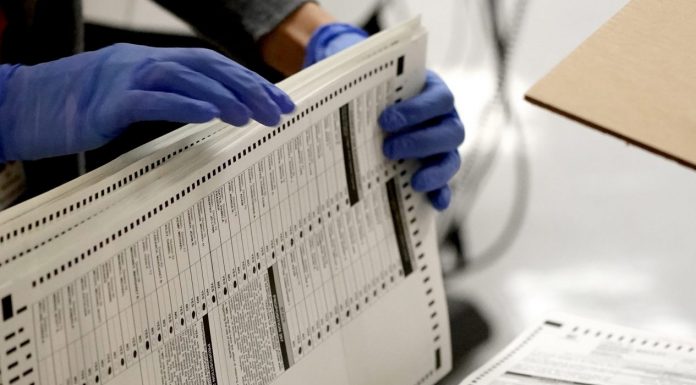(Headline USA) The Supreme Court appeared ready Tuesday to uphold voting restrictions in Arizona in a key case that could reaffirm state legislatures’ efforts to protect election integrity.
That would make it harder for Democrats to challenge a raft of other voting measures Republicans have proposed following last year’s elections, which were rife with unconstitutional abuses of state law, as well as systemic, widespread vote fraud.
A large majority of Republicans maintain that the Left’s election-meddling efforts—many under the auspices of “emergency” pandemic measures—helped secure the race for President Joe Biden while casting serious aspersions on his legitimacy.
However, Republicans are not the only ones who are aggressively pursuing legislation in response. House Democrats are attempting to push through a federal election overhaul that would help codify many of those same dubious practices and would likely ensure permanent leftist majorities.
Despite having repeatedly failed to come through for Republicans several times in recent election-related court cases, all six of the so-called conservative justices—those appointed by Republican presidents—suggested they would throw out an appellate ruling by the liberal Ninth Circuit Court.
That ruling speciously sought to strike down Arizona’s state laws as racially discriminatory under the 1965 Voting Rights Act.
Democrat activists had hoped to broaden the standard for claiming discrimination under the law, which originally targeted only the segregationist “Jim Crow” states during the Civil Rights era.
The outcome could make it harder, if not impossible, to use the Voting Rights Act to sue over long-supported, common-sense measures that leftists now claim create obstacles to voting.
Among those are voter ID laws and prohibitions on practices such as ballot harvesting.
Seeing the Voting Rights Act as their pathway to deregulating state-run elections, Democrats and left-wing activists claim that the proposed restrictions would disproportionately affect minority voters, important Democratic constituencies.
The Arizona provisions under review were in place for last year’s voting. They are a 2016 law that limits who can return early ballots for another person and a separate policy of discarding ballots cast in the wrong precinct.
Both Chief Justice John Roberts and Justice Brett Kavanaugh pointed to the 2005 recommendation of a commission chaired by former President Jimmy Carter and the late James Baker to eliminate ballot collection, among other ideas to reduce the chance for election fraud.
Kavanaugh said the recommendation seemed to be the sort of “circumstance that puts a thumb on the scale in favor of the legitimacy of the rule.”
Jessica Amunson, representing Arizona’s Democrat Secretary of State Katie Hobbs in opposition to the restrictions, said the court should not ignore the state’s experience with ballot collection.
“Arizona had a 25-year history of literally not a single instance of fraud with ballot collection,” Amunson claimed.
Justice Elena Kagan asked a series of questions that seemed to be aimed at other restrictions that could find their way to the court, including reducing time for early voting and eliminating polling places.
Michael Carvin, representing Republicans, said the examples Kagan posited “have never existed in the real world.”
Kagan replied that they didn’t “seem so fanciful to me.”
The high court’s last major Voting Rights Act decision was in 2013, when a 5-4 conservative majority gutted the part of the law that forced state and local governments with a history of discrimination, including Arizona, to get advance approval from the Justice Department or a federal court before making any changes to elections.
Roberts wrote the court’s opinion, saying that the laws had become antiquated and flew in the face of state sovereignty, as well as the constitutional principle that all states are equalt.
The current case involves the remaining portion of the law that applies nationwide and still prohibits discrimination in voting on the basis of race.
A decision is expected by early summer.
Adapted from reporting by the Associated Press

